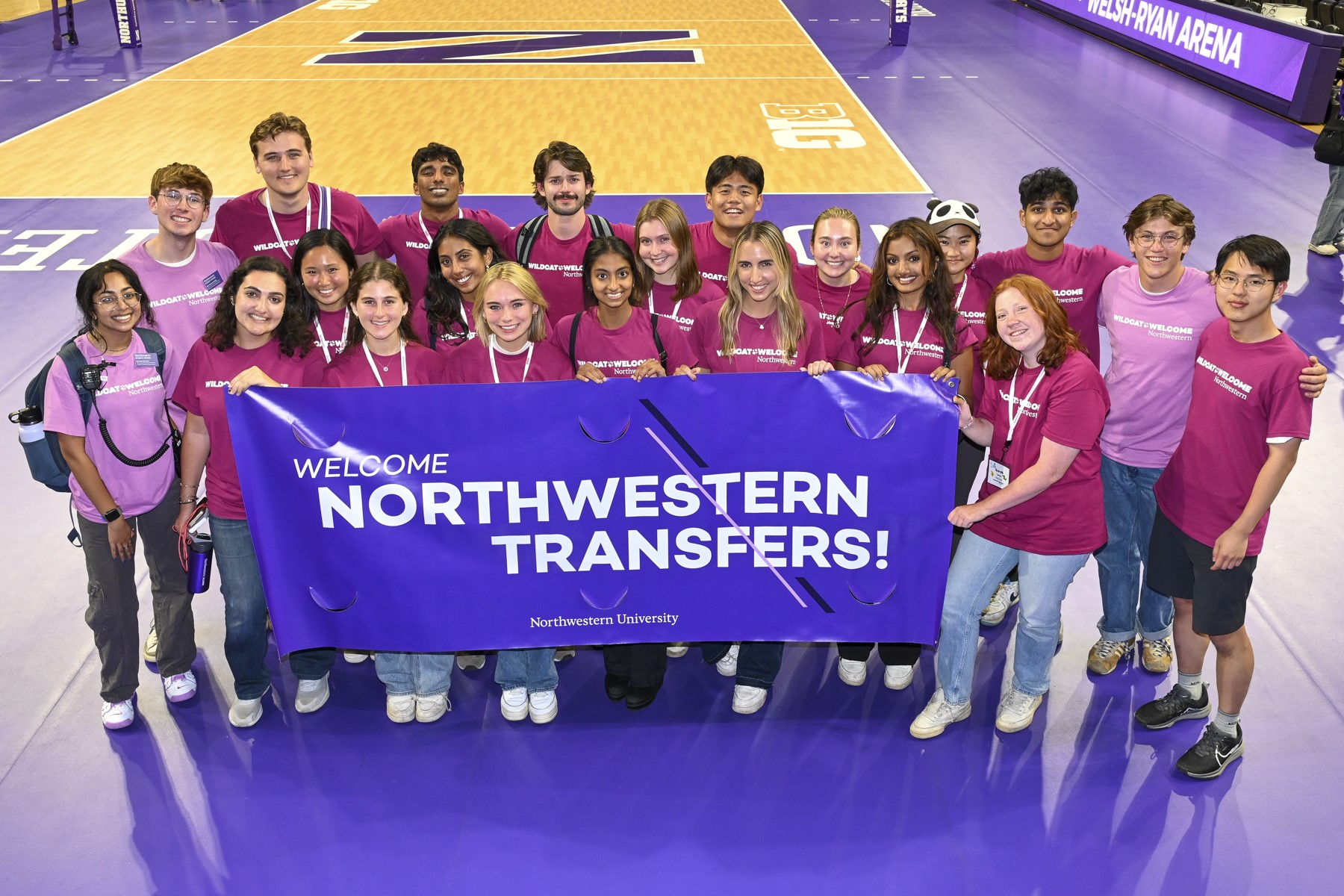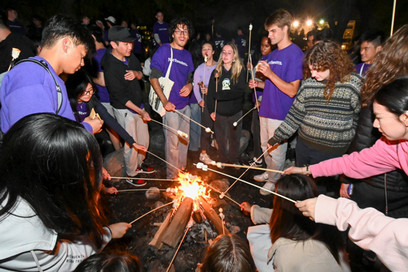Everything You Need to Know About Being a Peer Adviser
Being a PA makes me fall in love with Northwestern all over again.”
Carolyn King
Transfer Peer Advisor, 2023
Learn how PAs support an essential Northwestern experience
When incoming undergraduates arrive on campus, they’re immediately immersed in a welcoming series of orientation events designed to help students connect, discover new dimensions of themselves, navigate the university, and ground that in wellbeing for the journey.
First, international students attend International Student Orientation in early September before domestic students join them for Wildcat Welcome, a multi-day orientation and a quintessential Northwestern experience.
New Wildcats are guided through these events by returning students who serve as peer advisers (PAs). In this role, they provide informal and formal opportunities for new students to ask questions and learn candidly about Northwestern directly from people with similar programs of study or potentially shared identities.
“Peer Advisers and International Peer Advisers are essential to new students' orientation at Northwestern for many reasons, but most notably, they can provide something staff and faculty can't: a current, relevant and helpful insight into life as a student,” said Merci Sugai, assistant director, Student Transition Experiences. “The peer-to-peer aspect is such a valuable part of the orientation experience, and we are really thankful to work with such a great population of student leaders who provide that to incoming students.”
Below is information on the application, training process and expectations of PAs throughout Wildcat Welcome.
International Peer Advisers
International Peer Advisers (IPAs) kick off the orientation process with International Student Orientation.
To apply to be an IPA, there is a written application before an interview with an Office of International Student and Scholar Services coordinator and an IPA executive board member. This process occurs in February and March.
Once selected, students participate in four training courses throughout the Spring Quarter and two online sessions before International Student Orientation (ISO) that help them develop effective facilitation and leadership skills.
“ISO is more hands-on [than Wildcat Welcome],” said Weinberg and Bienen junior Dami Akanni, who served on the executive board for ISO this year and as an IPA the year prior. “You help students move into campus and pick up students at the airport. I had a really good Peer Adviser, so I wanted to replicate that experience for other students.”
During ISO, IPAs help with a variety of tasks, including helping students make bank accounts and learn about immigration requirements, as well as planning events like Engagement Day, which includes community builders on the Lakefill, fast friending, and Regional Networking, which fosters connections between students from regions close to their own.
After ISO, IPAs line the sidewalks on Northwestern’s Evanston campus and cheer for their students as they participate in March Through the Arch on the first day of Wildcat Welcome.
“I think moving to a new country and seeing people going through the same struggles as you are is very comforting,” Akanni said. “There's things that we wouldn't think about in Wildcat Welcome, so ISO gets those things cleared up before school starts.”
First-Year and Transfer PAs

To apply to be a PA for first-year or transfer student, applicants must first attend an information session in January. Then, they can fill out the application, which is due in late January and includes essay questions about why applicants want to be a PA and how their identities may impact them in that role. Applicants are notified if they have advanced to the interview stage in early February.
The interview involves a one-on-one conversation with a student board member and a group interview with other PA applicants.
Students are notified if they’ve been selected to be a PA by mid-March.
During Spring quarter, PAs begin training during a retreat during which they meet their board group, and they also participate in the six-week Peer Adviser Leadership Training series. They finish the Spring by attending an all-staff meeting.
Five days before Wildcat Welcome begins, it’s time for PA Camp, when PAs learn about the True Northwestern Dialogue conversations they will lead with their groups, expectations for the week and participate in PA camp board games, a friendly competition and relationship-building activity for board groups.
“I think it can be a lot of information, especially as a first-year PA,” Communication senior and transfer PA Carolyn King said. “But they give us a lot of structure for learning it all. We get binders with all our references and an in-depth schedule.”
Then, Wildcat Welcome begins.
What to Expect During Wildcat Welcome
Throughout the week, PAs lead a campus tour and bring their students to campus traditions like March Through the Arch, Purple Pride, New Student Convocation and evening events for getting involved and building community among other events.
“What I always like to emphasize to my PA group is this is not a conversation that is led by me or that I am teaching,” McCormick junior and PA Omar Sharaf said. “It's a dialogue that we are all coming into at an equal level.”
Both King and Sharaf emphasized the importance of orientation at Northwestern and the impact a PA can have on first-year and transfer students.
King transferred to Northwestern after her first year and said she expected her college experience to feel “fractured” because of it. “Instead, when I transferred, I got to go through Wildcat Welcome,” King said. “I was immediately put into a community with people who had things in common with me, but, in so many ways, were different from me.”
“Instead, when I transferred, I got to go through Wildcat Welcome,” King said. “I was immediately put into a community with people who had things in common with me, but, in so many ways, were different from me.”
King has now served as a PA twice after her experience as a transfer in Wildcat Welcome, and said she found an amazing community in her fellow PAs.
“Being a PA makes me fall in love with Northwestern all over again,” King said.
Sharaf completed his second year as a PA this fall, and said he saw it as an opportunity to share resources for first-generation and low-income students coming into Northwestern.
“I had a difficult transition to Northwestern as a first-gen, low-income student,” Sharaf said. “I wanted to be someone I wish I had my freshman year.”
King emphasized PAs should not feel pressure to conform to a “camp counselor” personality.
“I think you can be an awesome PA as yourself. It’s not a performance,” King said. “Think about what makes you, you, and I know that your students will probably be really excited, especially if you haven’t seen a PA who is like you before.”
- Peer Advisers: The application process for PAs is open through January 22. Find more information on the Peer Adviser application process.
- International Peer Advisers: The application for International Peer Advisers is open through January 28. Find more information on the International Peer Adviser application process.
